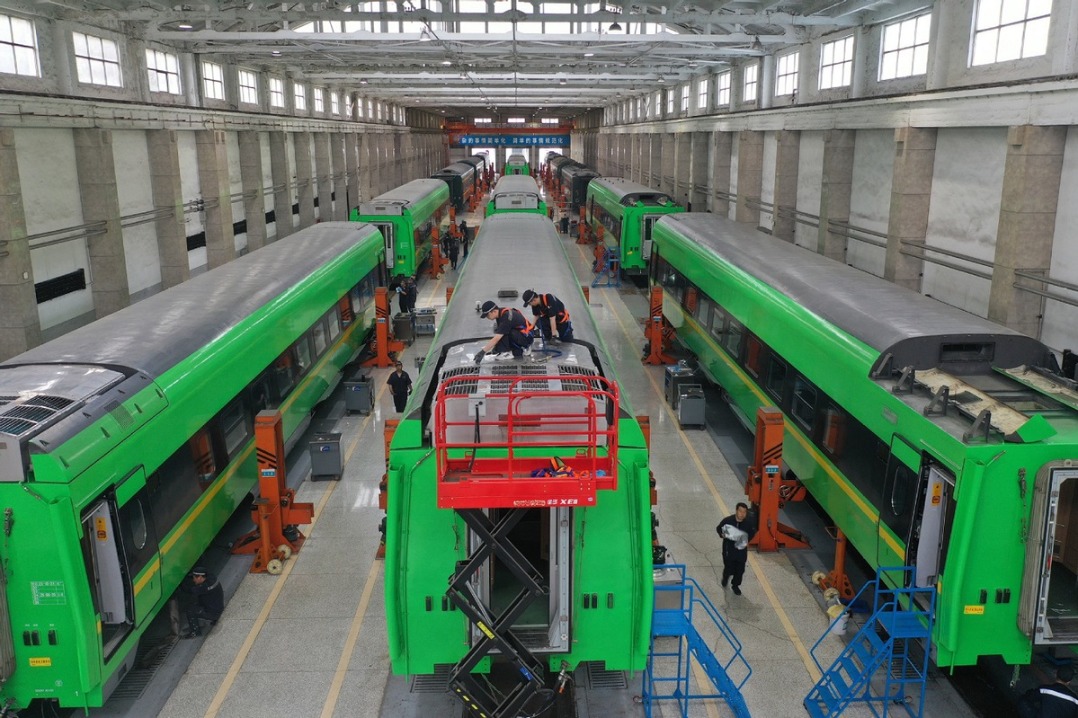Survivors move into warmer, safer temporary homes


Victims of the 6.8 magnitude earthquake in Dingri county in Shigatse, Xizang autonomous region, are moving from tents to temporary homes with improved living facilities.
Guring village in Dramso township, one of the areas most severely affected, has seen 80 temporary homes constructed just two days after the earthquake struck on Jan 7. All 200 villagers moved into these homes on Sunday, said Tsering Phuntsok, Party secretary of Guring.
Compared with tents, the homes offer better sealing and thermal insulation, making them resistant to fire, wind and earthquakes. Equipped with heaters and stoves, indoor temperatures can reach 20 C, a much warmer option in an area where temperatures can drop to as low as — 18 C at night.
The 18-square-meter homes on unused farmland are also a big upgrade from the tents the survivors were using.
"The shelters are warmer and safer. Villagers feel more at ease facing aftershocks. There are beds, tables, electricity, Wi-Fi and television," Tsering Phuntsok said.
Nearby, there is access to tap water and public restrooms. Military personnel provide three meals a day for residents, and volunteers distribute food. Some locals also cook for themselves, Tsering Phuntsok said, adding that the tents are now being used to store supplies.
The earthquake, which struck the region that is home to Mount Qomolangma — known as Mount Everest around the world — has left 126 dead and hundreds injured. Disaster-relief efforts are currently focused on relocating affected villagers and initiating post-disaster reconstruction, according to local authorities. Approximately 47,500 people are now living in 224 resettlement sites after more than 3,600 houses collapsed.
As of 6 pm on Sunday, around 2,200 temporary homes have been built. Available supplies include quilts, blankets, heating equipment, winter clothing, lighting facilities, rice, flour, oil, meat, vegetables, fruit, drinks and forage grass.
Fan Lin, director of the disaster-relief department of the Red Cross Society of China Yunnan Branch, said his team had transported 200 mobile restrooms to the earthquake-stricken area.
"The restrooms are easy to clean and suitable for use in high-altitude regions. They also help with epidemic control," he said, adding that they can serve about 10,000 people.
Previously, many victims had to relieve themselves outdoors, so the restrooms now provide much-needed privacy, he added.
To maintain sanitation at the relocation sites, Losang Tsering, an official from Phangyi township, and seven colleagues have been voluntarily collecting garbage in Tsogo township since last Tuesday night.
"We pick up trash along streets and dining areas, mainly beverage cans, instant noodle bowls, plastic packaging, toilet paper, water bottles and leftover food," he said.
Each day, five to six small trucks are filled with garbage. Altogether, 6 metric tons of trash have been collected in the past few days.
"We bought gloves and masks ourselves, while brooms and garbage trucks were provided by the township," he said. "Although we work at least four hours daily and sometimes soup stains our clothes, it's satisfying to see the streets clean through our efforts."
To meet medical needs, mobile hospitals have been set up in the disaster areas.
Kelsang Yudron, director of the Xizang Health Commission, said during a news conference on Thursday that the goal is to ensure each resettlement site has at least one medical support team with prominent signage, medical staff, emergency medications and regular medical rounds.
Butruk, a surgeon from Shigatse Tibetan Hospital, said he treated patients with fractures and other injuries at the county hospital's emergency department last Tuesday night. After many patients had been discharged, he shifted to Kyiding village to focus on disease prevention. He also prepares Tibetan medicinal soup for the villagers to help prevent them from catching cold.
Jiang Yaowen, a doctor from the West China Hospital of Sichuan University, said his team brought a computerized tomography scanner in a mobile medical bus to assist at Tsogo resettlement sites.
"Villagers who feel unwell can visit us, and our doctors will determine if a CT scan is needed. We also explain the CT results to them," he said, adding that patients requiring further treatment would be transferred to the county hospital.





































